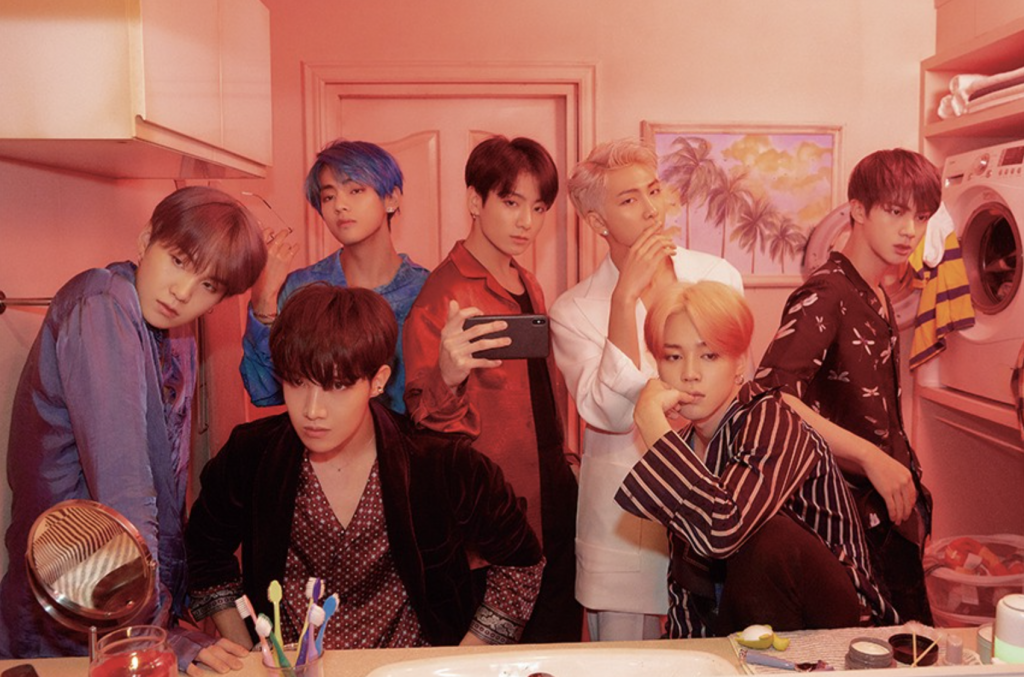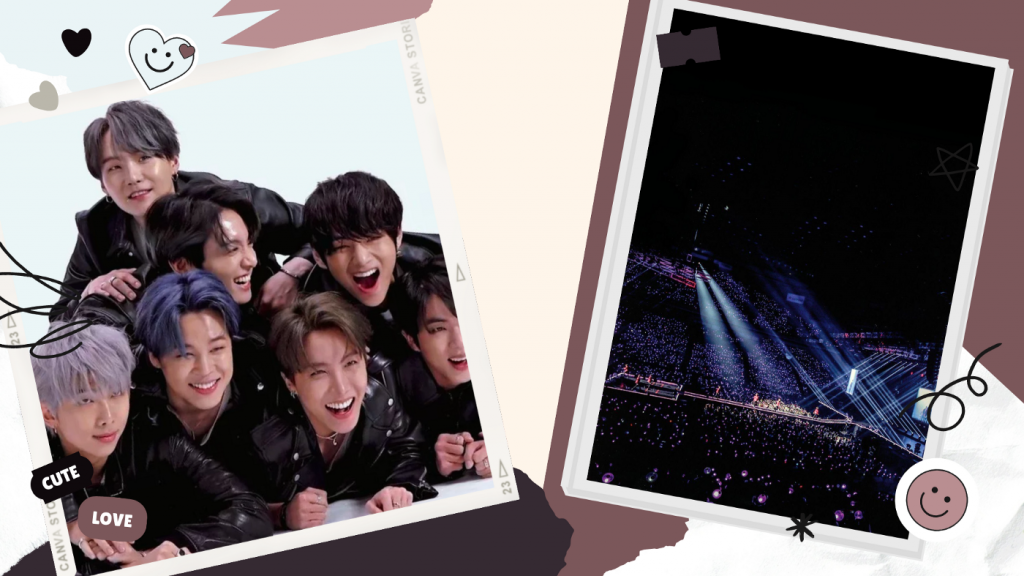How BTS formed a special relationship with fans
The parasocial relationship between BTS and their fans is like no other

Stephanie Reid first discovered the world of K-pop after hearing BTS’s “Euphoria” played in the season one finale of the popular HBO Max show, Euphoria. Since then, she became hooked. Being a fangirl is just who Stephanie Reid is. From the High School Musical cast to the Jonas Brothers to Justin Bieber, and now BTS. Fangirling is just a part of who she is. To be a fangirl is to be dedicated and loyal, which, without a doubt, Stephanie is. She moved from Jamaica to Brooklyn, New York, when she was 11 years old, and that’s when she discovered Justin Bieber for the first time after the “Baby” music video played on TV at her grandma’s place.
It’s been ten years since then, and now at 21 years old and a college senior studying Information Management & Technology, Reid is now an ARMY. She went down the rabbit hole of listening to more BTS songs and watching YouTube videos like “A Guide For New BTS ARMYs (who’s who & where to watch what)” to learn more about the popular South Korean boy band. What made them so different from her longtime idol of 10 years, Justin Bieber? She wasn’t exactly sure what made her experience with the band so different. Maybe it was the random live streams from the members or the reality shows they were on. All she knew was that she felt a lot closer to the group than she did in a decade with Justin Bieber.
With an ever-growing industry worth $5 billion, the K-pop industry has cultivated a special relationship between fans and their K-pop idols which has proven unique. What makes that relationship different from Western celebrities and their fandoms is the level of communication between the idols and their fans. “There is a much more direct line of communication between Korean artists and their fans. It’s almost expected because that is the culture; things are a lot more transparent,” says Han, a K-pop fan since 2008 and the Head of International Marketing for Silverstone Korea. “Whereas in the West, celebrities, you read about them but not as people that you talk to. So we don’t really have that personal relationship with famous celebrities.”
When looking at the relationships between fandom and celebrity, it falls under parasocial relationships. Parasocial interactions are a phenomenon where a one-sided relationship is formed when a person extends emotional energy, interest and time, towards media personalities, despite the personality being unaware of the other’s existence. K-pop fans will write letters to their idols, meet them through fan signs, whether online or in-person, and K-pop idols will do live streams, where fans will be able to ask questions in real-time and receive answers. “It feels like a much more personal relationship, which therefore makes people feel that those relationships are stronger because they’re reciprocated,” says Han.
The fan experience is different from the western fan experience, and it’s all about community. A huge part of being a fan of these idols is connecting with other fans online. Most fandoms reside and share content on Twitter. Fans also connect on other platforms like TikTok, Instagram, and Facebook, but Twitter is the most popular among K-pop fans whether they like NCT 127, GOT7, Twice, or BTS. “Every fandom has its moments, but I’ve had more fun within K-pop spaces. I think it’s due to the fact there is an abundance, and maybe oversaturation, of content accessible, whereas in Western fan spaces, you’d have to wait weeks or years on end for new content,” says Reyah, a film student from Virginia and a longtime BTS fan. “I do think this content is a smart way to try and limit and deter fans from digging into these idols’ private lives like how Western fans and media tend to do.”
Concerts are a huge part of the fan experience, and they’re a lot different from what you may experience from a Western artist. Yuki, a 21-year-old K-pop fan since the age of 6, has been to seven BTS concerts, and she explains that there’s no comparison between the two because K-pop concert culture is a lot different than a concert from someone like the Jonas Brothers or Justin Bieber. “There are fan chants and light sticks, a culture that western artists and fans don’t participate in,” says Yuki. It’s not comparable to the fan chants, light sticks, or even the outfits that fans will wear to the concert.

Community is a massive part of what makes the fan experience even more worthwhile, especially at a concert where thousands of fans come together to see their favorite idols perform for 2–3 hours. I attended my first ever concert in 2018, which happened to be BTS’s Love Yourself concert in Newark a month into my freshman year at Syracuse University. I had just moved from England back to the U.S. for college, and my mom was scared that I’d be traveling from Syracuse to Newark alone to attend the concert. She asked me to stay in my dorm room, which obviously I didn’t. Going to the concert by myself was scary at first but as soon as I went to the venue, I met ARMYs that I hung out with throughout the night. The day after, I had a layover in New York City for two hours and hung out with ARMY that I met at the bus station, who also went to the concert. Rachel Noh, an ARMY from Georgia shared the same sentiment with me. “Rather than being fans, it feels a lot more welcoming and family-like,” says Rachel. “For example, I would never go to a Western artist concert alone, but I didn’t have an issue going to a BTS concert by myself twice. I can easily make friends at the BTS concert and really make conversation with anyone there, and everyone is so sweet and nice.”
BTS has cultivated a unique relationship with their fans but this sentiment doesn’t only relate to the popular boy band. Morgan, a Sociology & Criminology student from Wales, United Kingdom, went to a concert to see the Korean indie band, The Rose. Despite the show being in a small venue, she explains that there was a sense of a strong connection between the group and their fans, Black Rose. “There were no casual fans there, just people who were passionate for this group and their music and message,” she says. “It was a strong sense of comfort there, almost to the point where it didn’t feel like a concert but more just a meeting.”
The impact that these K-pop idols have on their fans is undeniable. You don’t expect there to be such a personal relationship between a public figure and their fans. Other fans engage with the content their favorite public figure puts out, buy their merchandise or see them in person, and that’s where it ends. For K-pop fans, not only do their favorite idols impact them personally, but the fans are also able to impact their idols. During BTS’s Love Yourself world tour, leader and rapper RM shared with ARMY at the CITI Field Stadium concert in New York, “I didn’t know anything about how to love myself. You guys taught me through your love, through your tweets, through your letters, through your everything,” he said. Later he implored, “Please use me. Please use BTS to love yourself because you guys taught me how to love myself. Every day.” Reyah shared with me that they found themselves going through many existential crises as they grew up with BTS. “Literally last year, I found myself crying with them about falling out of love for my passion to create, and then sometime before that, I felt like I wasn’t going to be good at the things I can do and be,” says Reyah. “Then boom, here they come saying “me too.”
When you’ve been a longtime fan of someone, you find yourself becoming attached. Being emotionally attached isn’t necessarily a bad thing, but solely depending on someone can be unhealthy, whether an idol or a friend. Daezy, a graduate student from Maryland, shared that they don’t currently find themselves getting too emotionally attached when it comes to their love for BTS. Still, things were a bit different when they first discovered the group. “When I first found BTS, I was in a much worse headspace and almost solely relied on them for happiness. They are still a great source of happiness to me now, but in a more measured way,” says Daezy. “If anything, BTS inspired me to find other interests and make new friends through the fandom, and so I’m not unhealthily attached to BTS because I have other interests and hobbies I can turn to if for some unlikely reason that I’d ever need a break.”
Rachel explained that her relationship with BTS during quarantine was the most unhealthy. “Since I was alone a lot of the time with nothing to do, BTS kind of became my support system in a way, which is fine to an extent, but during quarantine, I felt like my love for them was extremely excessive,” she shared. “I would rely on them for everything a bit too much, which becomes pretty unhealthy eventually.” It’s common with parasocial relationships that fans express their appreciation for their idol for helping them get through tough times and often look to them as a sense of comfort and happiness. As a longtime K-pop fan since 2012 and an ARMY since 2015, I can say for sure, and just from what I’ve seen from other ARMY, many of us found BTS at a time in our lives when we were going to go through a rough patch. To this day, I always speak of how much I’ve learned from BTS and how they helped me become a better person.
Parasocial interactions are often viewed negatively, whether it be sasaengs or the obsessive fans that western artists may have. There’ll always be the good, the bad and the ugly. One thing for sure is that the relationship between K-pop fans and their idols goes beyond the music, and millions of lives are positively impacted. Kaylee Martinez, a K-pop fan since 2018, shares that BTS helped her through a rough time like many others, and she got a tattoo that says “love yourself” with a sound wave that plays Jin’s solo song “Epiphany.” “I just really value them as people, and the message they share to their fans and people they meet is beautiful,” she said.





